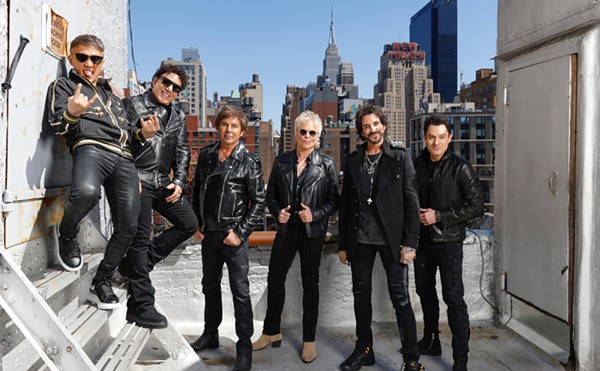
With a twinkle in his eye, Rick Springfield leans into the camera and says “You see, sometimes little pop tunes can change the planet!”
It’s a choice moment that happened during the filming of the 2013 documentary An Affair of the Heart, a film that examined the relationship between Springfield and his fans and the extent to which his music has changed (and remained a part of) their lives in the decades since he first popped onto the radar for many future fans with his breakout hit “Jessie’s Girl” in 1981.
During a telephone conversation from Nashville, Springfield, who performs on Saturday at Hard Rock Live, reveals that he’s just as surprised as anybody else about the impact that his songs have made with fans — and continue to make. The documentary showed a depth of devotion from his followers that went far beyond the concerts and the community that has developed over the years. Frankly, that was something that caught the Australian-born singer-songwriter and actor a bit off guard.
“You know, human beings feel like once somebody leaves the room, they stop existing and that life is all about them. [Laughs] So it was really revealing to know that the life went on afterwards and they took their love of the music home and hooked up with people and made friends through the shows. That was pretty revealing for me.”
Spend a little bit of time talking to any serious fan of Rick Springfield’s music and you’ll get an endorsement of a man who has written a lot of great songs over the years and yet because of his years as a teen idol and heartthrob, he’s had to fight for credibility as an artist and a songwriter. His friend and fellow actor Corey Feldman feels like that’s a real injustice, as he shared during an interview for the documentary.
“I really don’t feel that he gets the credit that he is due. I mean, he deserves a lot more credit and a lot more respect, because of the fact that he is a brilliant songwriter. He’s written some of the most powerful and incredible songs in rock and roll history, period. And I don’t just mean ‘Jessie’s Girl.’”
Documentary producer Melanie Lentz-Janney thinks that Springfield’s songs continue to resonate because he wrote from a real life perspective that was easy for fans to identify with. She shared her thoughts on that subject with us during a recent phone conversation from her Florida home.
“It’s definitely that the music speaks to my soul. For a lot of us, it’s timing, his music hit us at a time when we’re growing up, we’re falling in love for the first time and you know, there are all of these firsts. We kind of attach to the emotions, because that’s such an emotionally fueled time in our lives. I do think that’s certainly part of it. I also think….and I’ve told him this, he kind of came out [after] that whole ‘macho man’ thing from the ‘70s and he was sensitive and that was something really new to hear. You know, his music, everything is kind of [written from] the guy’s perspective and a guy’s vulnerability. I think that’s part of the reason that all of the women ate it up so much, is because it was like ‘Boy, this really good looking guy is having trouble relating with and communicating with women.’ We can all kind of relate to that. It was comforting.”
Springfield has been on the road in recent months examining those songs from a new perspective with a series of “Stripped Down” performances, shows which feature only Springfield and a few guitars, sharing songs and an evening of stories. The intimacy and interactivity of the performances have put a new light on the full band shows like the one that Springfield will play this week at Hard Rock Live.
“I really enjoy the full band shows a lot more now. I really look forward to the camaraderie onstage. I have a great band and we all like each other a lot and it’s a great energy. That’s where I get my workout.”
Released in 2012, Springfield's latest album Songs For The End Of The World is an energetic collection that proves that as a songwriter, he’s still very much creatively engaged. He still works tirelessly at the art of crafting songs.
“I still put a lot of effort into it. It’s still very important, right down to the last line for me. I still think that I write in the same way [that I always have] — I look for a great melody and a great idea and then write the words. It’s still basically a similar process. I’ve written with other people recently too, so that kind of changes it a little bit.”
“Our Ship’s Sinking” is one track from the album that sticks out as a highlight, vibrantly pulsing with a feeling that’s almost like a Fall Out Boy song in its tone, even if Springfield himself doesn’t see it quite that way.
“We listen to a lot of stuff and I don’t know if it’s Fall Out Boy — it may be more like we were listening to Skrillex a lot when we were doing that so we could do something with the guitars that’s actually never been done where we chop it up and make weird sounds out of it. It’s all guitar on there by the way, too. So that was kind of I think more dubstep-inspired than Fall Out Boy. But you know, I listen to a lot of the new things and that’s what’s exciting to me is hearing new approaches. With 12 notes, there’s still some great original stuff coming out and it blows my mind.”
Springfield says that the songwriting process came pretty easily to him, even when he was young. He points to a song that he wrote when he was 15 and says that even though it’s “horrible,” he thinks that “I was pretty comfortable with it back then.”
He’s beginning to dig in and look towards writing songs for his next album.
“Matt Bissonette, the guy that I wrote the last record with, just sent me some ideas. I was actually [just] on a bus with one of the Rascal Flatts guys [bassist/vocalist Jay DeMarcus] who is in a TV show that I was filming and we got iced out just outside of Atlanta, so I couldn’t catch a flight to Nashville. He was going to Nashville on his bus, so I hitched a ride with him and we wrote a song on the way in. So I’m really starting to gear up about what my next record will be and we will see how it pans out.”
The experience of penning his autobiography Late, Late At Night, which was released in 2010, made him comfortable as an author in the written sense, so much so that he’s preparing to release Magnificent Vibration, his debut fiction novel, in May. The book’s tagline, which says “Sometimes heavenly intervention can put you through hell” is one that doesn’t feel so far removed from some of the themes that have popped up in Springfield’s songwriting over the years. Bobby Cotton, the main character, is described in advance materials about the book as “a hero who has hit a dead end in his life, who serendipitously receives a 1-800 phone connection to God via an inscription in a mysterious self-help book that may just give him a shot at saving the planet.”
For those who have been following Springfield’s work in song over the years, Magnificent Vibration sounds like another fine addition to the stack of stories that he’s shared thus far. There are certain similarities when it comes to the creative process — as he puts it, “it’s like writing a really long song that just goes on and on and on.” But there are also a few key variations, as he shared with us.
“They’re very different disciplines. You know, songwriting, it’s a short thing — there’s a whole rhyming aspect to songs that creates a whole other area for your brain to go. Because I’ve had to rhyme a word in a song and in [the process of] searching around for a rhyming word, I’ve come up with a whole thought process for a line that I would never have come up with if I just had to stick another line below it. The whole rhyming discipline creates some pretty cool things that you wouldn’t normally come across. It’s different lines of thought. With prose, you have a different kind of freedom, so you have more of an off the top of your head kind of stream of consciousness thing when [you] write prose.”
As a young student, the only good grades that Springfield got before getting the boot out of school came for his creative writing, so he’s naturally thrilled that all of these years later, he has a second opportunity to pursue a career writing fiction. While he isn’t short on things to do, he’s enjoyed the writing process enough that he’s already got a follow-up book in the works that will continue the story that he began to tell with Magnificent Vibration. He’s hesitant to review any details about that second book, “because it would give away everything that the first book is about,” he says with a laugh. But he’s thrilled at the early reception that the book is getting so far, particularly the positive review he recently received from Kirkus Reviews, an important literary voice in the book world.
“They gave a great review on it, so I’m very excited. Hopefully people won’t give away some of the things like Darth Vader is Luke’s father, you know, that kind of stuff.”
How can you not like a guy who wraps up an interview with a Star Wars reference?








![Mourning [A] BLKstar.](https://media1.clevescene.com/clevescene/imager/clevelands-mourning-a-blkstar-returns-with-sophisticated-suite-of-new-songs/u/golden-s/44709952/screen_shot_2024-07-12_at_10.18.29_am.png?cb=1720806957)



